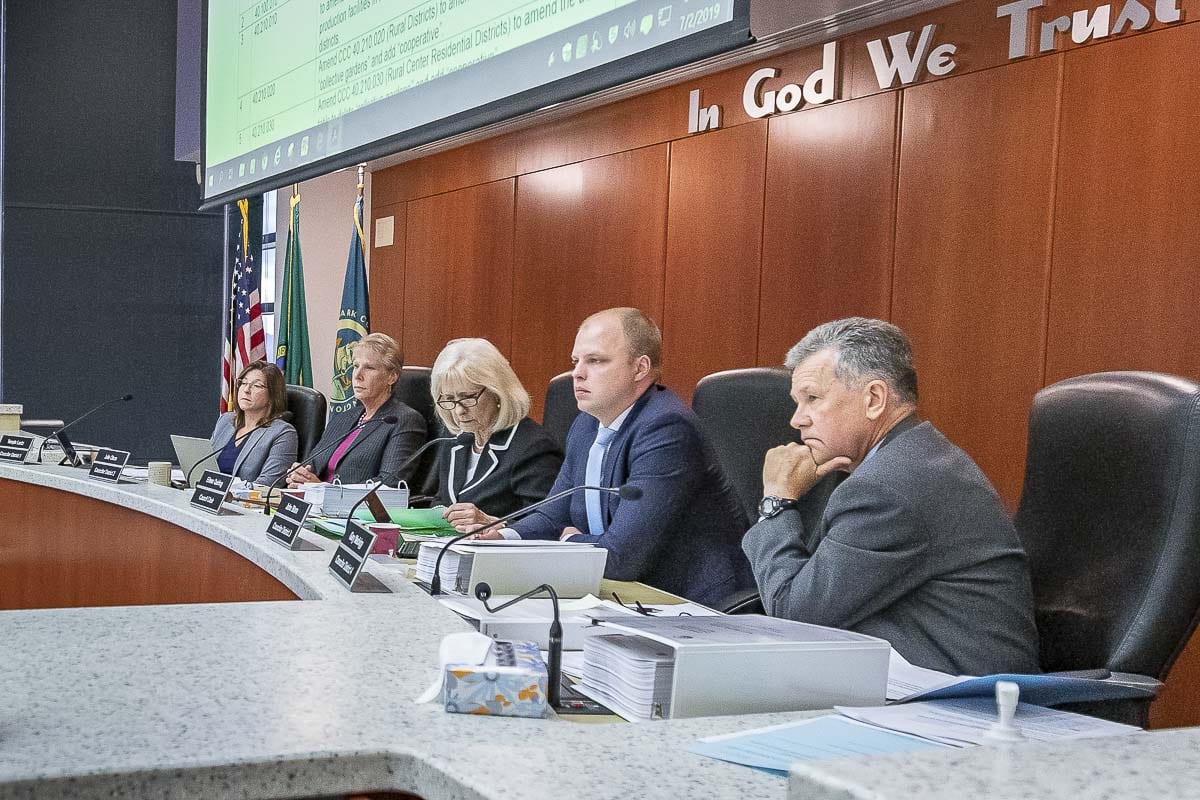Three of the five councilors were facing ethics complaints
CLARK COUNTY — With more than half of the Clark County Council’s five members now facing ethics complaints, the governing body made the decision on Wednesday to table all pending complaints for now and temporarily suspend their rules of procedure under the Code of Ethical Conduct.
“it’s really become painfully evident that there’s really no defined process,” said Councilor Julie Olson who, along with Gary Medvigy, were assigned to an ad hoc committee to look into a complaint against Clark County Chair Eileen Quiring.

The county’s current ethics complaint review process assigns two council members, who then select a citizen to chair the ad hoc committee.
Since the complaint against Quiring, two other council members have had ethics complaints filed against them, both by Eric Temple, president of the Portland-Vancouver Junction Railroad.
Temple has accused Councilor John Blom of threatening him, through a lobbyist friend, if Temple didn’t order the Clark County Republican party to not use most of a $20,000 donation from PVJR to support Karen Bowerman, who is running against Blom in the upcoming primary election after Blom changed his party affiliation to Independent.
The council made a decision last week to table that complaint against Blom until they could further discuss the process. Later that same day, Temple filed a second complaint against Lentz, alleging she had violated the Code of Conduct in decrying his complaint against Blom “without reviewing any evidence,” and falsely claiming that her company, High Five Media, was not currently involved with Blom’s campaign, though he did work with them four years ago.
Blom later clarified that he had retained Jim Mains, Lentz’s partner at High Five Media as a consultant, but through Mains’ other business endeavor, Main Distinction. Campaign finance records bear out that claim.
Still, facing the ongoing drama, Olson and Medvigy said that they could find no way to move forward with the ad hoc committee as it is presently designed.
“We were diligently trying to do our best in making this work,” Medvigy said during Council Time on Wednesday. “I think that it’s incumbent on each and every one of us to adhere as best we can to ethical conduct and a code of conduct … but as far as an enforcement section right now, with a body of only five people with three pending complaints, it’s somewhat untenable.”
Medvigy, a retired Sonoma County judge, held up a hardbound book covering the code of conduct for elected officials in the state of California, noting that it is over 1,000 pages.
“We have two pages between the procedure and the Code of Conduct itself,” he said. “There’s just huge gaps.”
“Just the simple process of appointing a citizen over the last couple of weeks really demonstrates that there’s no defined process and there’s no procedure,” Olson said, adding that serious questions are left unanswered by the county’s current code. “How do we define a charge versus a complaint? How many ad hoc ethics committees can we have at one time? How do we manage the situation we’re in right now, where three of five counselors have a complaint filed against them?”
Without directly addressing Temple’s complaint filed against her, Lentz added that the current rules of procedure for ethics complaints clearly leaves room for potential abuse.
“We need to have a process to address complaints from the community which are valid and pertinent to the work of the council,” said Lentz. “What we’ve seen with the recent complaints that we’ve received is that the paragraph in our rules that covers this is vague and can be co opted or even abused.”
In a brief email to interim County Manager Kathleen Otto, Temple said he was “disappointed” that his charges wouldn’t be heard currently, but “I fully applaud your suspension of all current complaints due to an unworkable process.”
Quiring noted that the section of the Code of Conduct pertaining to the ad hoc committee was added in 2016, and this is the first time it has ever had to be put into practice.
“And because of the fact that we’re trying to use it, it has been revealed to be problematic,” she said.
While the council voted to suspend the rules of procedure in their Code of Ethical Conduct for six months, Medvigy noted that the public still has a mechanism for filing complaints if they feel that laws have been broken, including the Public Disclosure Commission, and the Prosecuting Attorney’s office, “So it’s not like there isn’t an avenue for normal investigation on a broad range of complaints.”
“We’re not trying to not do this work,” added Olson. “We just don’t have the structure defined to be able to do the work.”
The council ended by directing staff to begin the process of researching potential changes to the review process for ethics complaints, with updates to come at future meetings.
The issue may also be one for the Home Rule Charter Review Commission to take up. The 15-member body will be made up of people elected this coming November, and will be tasked with examining the 2014 Home Rule Charter, which created the five-member County Council, with four districts and the at large chair position, as well as creating division between the legislative and executive branches of the county.
A total of 52 people filed to run for the 15 seats on the Charter Review Commission.




